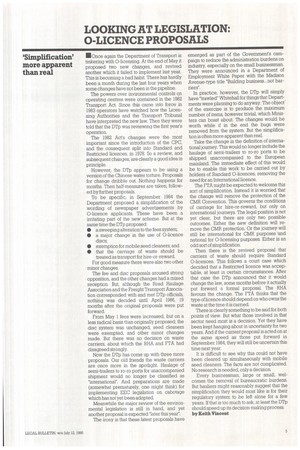'Simplification' more apparent than real
Page 31

If you've noticed an error in this article please click here to report it so we can fix it.
El Once again the Department of Transport is tinkering with 0-licensing. At the end of May it proposed two new changes, and revived another which it failed to implement last year. This is becoming a bad habit. There has hardly been a month during the last four years when some changes have not been in the pipeline.
The powers over invironmental controls on operating centres were contained in the 1982 Transport Act. Since this came into force in 1983 operators have watched how the Licensing Authorities and the Transport Tribunal have interpreted the new law. Then they were told that the DTp was reviewing the first year's operation.
The 1982 Act's changes were the most important since the introduction of the CPC, and the consequent split into Standard and Restricted licences, in 1978. So a review, and subsequent changes, are clearly a good idea in principle.
However, the DTp appears to be using a version of the Chinese water torture. Proposals for change dribble out. Nothing happens for months. Then half-measures are taken, followed by further proposals.
To be specific, in September 1984 the Department proposed a simplification of the wording of newspaper advertisements by 0-licence applicants. These have been a irritating part of the new scheme. But at the same time the DTp proposed: • a sweeping alteration to the fees system; • a major change in the use of 0-licence discs; • exemption for mobile seed cleaners; and • that the carriage of waste should be treated as transport for hire-or-reward.
For good measure there were also two other minor changes.
The fee and disc proposals aroused strong opposition, and the other changes had a mixed reception. But, although the Road Haulage Association and the Freight Transport Association corresponded with and met DTp officials, nothing was decided until April 1986, 19 months after the original proposals were put forward.
From May I fees were increased, but on a less radical basis than originally proposed; the disc system was unchanged; seed cleaners were exempted, and other minor changes made. But there was no decision on waste carriers, about which the RHA and FTA had disagreed strongly.
Now the DTp has come up with three more proposals. Our old friends the waste carriers are once more in the spotlight. Haulage of semi-trailers to ro-ro ports for unaccompanied shipment would no longer be classified as "international". And preparations are made (somewhat prematurely, one might think) for implementing EEC legislation on cabotage which has not yet been adopted.
Meanwhile the major review of the environmental legislation is still in hand, and yet another proposal is expected later this year".
The irony is that these latest proposals have emerged as part of the Government's campaign to reduce the administration burdens on industry, especially on the small businessman. They were announced in a Department of Employment White Paper with the Madison Avenue-type title "Building business.. .not barriers".
In practice, however, the DTp will simply have "trawled" Whitehall for things that Departments were planning to do anyway. The object' of the exercise is to produce the maximum number of items, however trivial, which Ministers can boast about. The changes would be worth while if in the end the bugs were removed from the system. But the simplification is often more apparent than real.
Take the change in the definition of international journey. This would no longer include the haulage of semi-trailers to ro-ro ports to be shipped unaccompanied to the European mainland. The immediate effect of this would be to enable this work to be carried out by holders of Standard 0-licences, removing the need for an International licence.
The FTA might be expected to welcome this sort of simplification. Instead it is worried that the change will remove the protection of the CMR Convention. This governs the conditions of carriage for hire-or-reward, but only on international journeys. The legal position is not yet clear, but there are only two possible outcomes. Either the new definition will remove the CMR protection. Or the journey will still be international for CMR purposes 'and national for 0-licensing purposes. Either is an odd sort of simplification.
Then there is the revived proposal that carriers of waste should require Standard 0-licences. This follows a court case which decided that a Restricted licence was acceptable, at least in certain circumstances. After that case the DTp announced that it would change the law, some months before it actually put forward a formal proposal. The RI-IA favours the change. The FTA thinks that the type of licence should depend on who owns the waste at the time it is carried.
There is clearly something to be said for both points of view. But what those involved in that sector need most is a decision. Yet they have been kept hanging about in uncertainty for two years. And if the current proposal is acted on at the same speed as those put forward in September 1984, they will still be uncertain this time next year.
It is difficult to see why this could not have been cleared up simultaneously with mobile seed cleaners. The facts are not complicated. No research is needed, only a decision.
Every businessman, large or small, welcomes the removal of bureaucratic burdens. But hauliers might reasonably suggest that the simplification they would most like is for their regulatory system to be left alone for a few years. If that is too much to ask, at least the DTp should speed up its decision-making process. by Keith Vincent




















































































